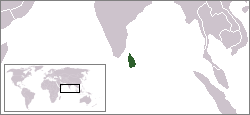Jaffna hospital massacre
Jaffna Hospital Massacre refers to the tragic event that took place on October 21 and 22, 1989, in Jaffna, Sri Lanka. During the late stages of the Sri Lankan Civil War, a conflict that spanned over two decades and involved the Sri Lankan government forces and the Liberation Tigers of Tamil Eelam (LTTE), also known as the Tamil Tigers, who were fighting for an independent Tamil state in the north and east of the island.
Background[edit | edit source]
The city of Jaffna, located in the northern part of Sri Lanka, was a major battleground during the civil war. It was predominantly Tamil and considered the cultural capital of the Tamil people in Sri Lanka. The conflict escalated in the late 1980s, leading to increased hostilities and violence in the region.
The Massacre[edit | edit source]
On the days of October 21 and 22, 1989, Sri Lankan Army troops entered the Jaffna Teaching Hospital, one of the largest healthcare facilities in the north. The soldiers were reportedly searching for LTTE militants believed to be hiding within the hospital premises. Over the course of two days, it is alleged that the troops killed approximately 60-70 people, including patients, medical staff, and civilians seeking refuge. The massacre is one of the most heinous acts of violence against healthcare facilities and personnel in the conflict's history.
Aftermath[edit | edit source]
The Jaffna Hospital Massacre drew widespread condemnation from international human rights organizations and further intensified the ethnic tensions between the Sinhalese and Tamil populations in Sri Lanka. It underscored the vulnerability of medical facilities in conflict zones and the dire consequences of military actions that fail to distinguish between combatants and non-combatants.
The event also highlighted the need for stronger international mechanisms to protect healthcare workers and facilities in conflict situations, leading to calls for the adherence to the Geneva Conventions, which seek to ensure the humane treatment of all individuals during war.
Legacy[edit | edit source]
The Jaffna Hospital Massacre remains a poignant reminder of the atrocities that can occur in times of war, particularly against non-combatants and those providing essential medical care. It serves as a case study in discussions on war ethics, the protection of healthcare in conflict zones, and the importance of international humanitarian law.
The massacre has been memorialized by the local community and serves as a somber symbol of the long-lasting impact of the Sri Lankan Civil War on the Tamil population and the challenges of post-war reconciliation and healing.
Search WikiMD
Ad.Tired of being Overweight? Try W8MD's physician weight loss program.
Semaglutide (Ozempic / Wegovy and Tirzepatide (Mounjaro / Zepbound) available.
Advertise on WikiMD
|
WikiMD's Wellness Encyclopedia |
| Let Food Be Thy Medicine Medicine Thy Food - Hippocrates |
Translate this page: - East Asian
中文,
日本,
한국어,
South Asian
हिन्दी,
தமிழ்,
తెలుగు,
Urdu,
ಕನ್ನಡ,
Southeast Asian
Indonesian,
Vietnamese,
Thai,
မြန်မာဘာသာ,
বাংলা
European
español,
Deutsch,
français,
Greek,
português do Brasil,
polski,
română,
русский,
Nederlands,
norsk,
svenska,
suomi,
Italian
Middle Eastern & African
عربى,
Turkish,
Persian,
Hebrew,
Afrikaans,
isiZulu,
Kiswahili,
Other
Bulgarian,
Hungarian,
Czech,
Swedish,
മലയാളം,
मराठी,
ਪੰਜਾਬੀ,
ગુજરાતી,
Portuguese,
Ukrainian
Medical Disclaimer: WikiMD is not a substitute for professional medical advice. The information on WikiMD is provided as an information resource only, may be incorrect, outdated or misleading, and is not to be used or relied on for any diagnostic or treatment purposes. Please consult your health care provider before making any healthcare decisions or for guidance about a specific medical condition. WikiMD expressly disclaims responsibility, and shall have no liability, for any damages, loss, injury, or liability whatsoever suffered as a result of your reliance on the information contained in this site. By visiting this site you agree to the foregoing terms and conditions, which may from time to time be changed or supplemented by WikiMD. If you do not agree to the foregoing terms and conditions, you should not enter or use this site. See full disclaimer.
Credits:Most images are courtesy of Wikimedia commons, and templates Wikipedia, licensed under CC BY SA or similar.
Contributors: Prab R. Tumpati, MD

